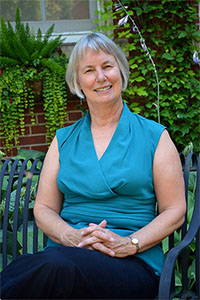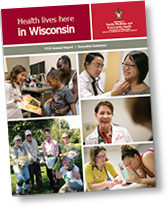
Valerie Gilchrist, MD – Chair, Department of Family Medicine and Community Health
January 1, 2016
Welcome to the DFMCH’s FY15 Annual Report, a summary of our activities from July 1, 2014, through June 30, 2015.
In FY15, we provided outstanding care for 414,112 patient visits in 21 statewide clinics, plus 28,074 patients at three urgent care sites.
We continued to improve patient care quality and delivery through the UW Health primary care redesign initiative. Our clinics completed the first phase of the Care Model redesign; coordinated new initiatives on depression and fall risk screening, eConsults and warfarin management; and are implementing the second phase of
the Care Model redesign.
As always, we are deeply committed to educating much-needed primary care providers for Wisconsin. Of our 39 residents who graduated in 2015, 62 percent entered practice in-state. Similarly, of the 31 PA Program students who are graduated in 2015 and are clinically employed, 71 percent entered practice in-state. We also supported the teaching of 616 UW School of Medicine and Public Health (SMPH) students. The American Academy of Family Physicians named the SMPH’s Family Medicine Interest Group a 2015 Program of Excellence.
Effective July 1, 2015, our Fox Valley program completed its transition to Mosaic Family Health, a new organization developed in collaboration with ThedaCare, Ministry Health Care, and the Medical College of Wisconsin.
Special congratulations go to one of our exceptional research faculty, Alexandra Adams, MD, PhD. She received a five-year, $7.5 million Wisconsin Partnership Program grant in support of the Wisconsin Obesity Prevention Initiative, a statewide project aimed at addressing Wisconsin’s obesity epidemic.
Finally, I’m proud to announce that on July 1, 2015, we officially changed our name to the University of Wisconsin Department of Family Medicine and Community Health. The name change formally recognizes the critical role that social and economic factors play in health, and reflects the community focus our department has had since its inception in 1970.

As we complete our 45th year, we look forward to more fully integrating with our institutional partners, improving the health of our patients and our communities, and educating world-class family physicians for our state, our nation and our world. Because health lives here, in Wisconsin.
Valerie Gilchrist, MD
Millard Professor in Community Health
Chair, Department of Family Medicine and Community Health
University of Wisconsin School of Medicine and Public Health
The DFMCH at a Glance
The vision of the UW Department of Family Medicine and Community Health (DFMCH) is to improve the health of the people of Wisconsin and the nation through leadership in family medicine education, clinical practice, research and community service.
Key Facts
- Chair: Valerie Gilchrist, MD
Administrative offices located at Alumni Hall in Madison. Education, research and patient care take place statewide. - FY15 revenue: $110 million
- Ranked fifth of family medicine departments nationwide in US News & World Report’s 2015-2016 edition.
- Residency program created in 1970 as one of the original 15 family practice residency programs; approved as a department in 1973.
Our People
- 941 employees (including 173 faculty) plus affiliations statewide.
- 7 new faculty in FY15; 2 faculty promotions.
Education
- Medical student education includes required and elective coursework, clerkships, workshops and summer experiences.
- Statewide residency programs (DFMCH-managed and affiliated) are dually accredited by ACGME and AOA and educated 128 residents in FY15. Of the 39 who graduated in 2015, 24 (62%) entered practice in Wisconsin.
- Academic, addiction medicine, complementary and alternative medicine (CAM) research, integrative medicine, primary care research and sports medicine fellowships offered.
- Campus- and community-based MPAS program educated 93 students; 39 graduated in 2015. Of the 31 clinically employed graduates, 22 (71%) entered practice in Wisconsin and 10 (32%) entered primary care. Also, 19 students graduated from the master’s degree completion program.
Patient Care
- 414,122 patient visits at 21 statewide clinics (157,952 total patient panel), plus 28,074 patient visits at three urgent care sites.
Research
- $6.6 million in grant awards in FY15. Research interests include alcohol/substance abuse, complementary/integrative medicine and nutrition/obesity prevention.
- Wisconsin Research and Education Network (WREN) partnered with primary care clinicians and communities.
Year in Review
July: 45 residents entered our statewide programs.
September: Tillman Farley, MD, presented the Farley Visiting Professor Lecture.
October: Thirteen faculty presented at the third Family Medicine Midwest conference.
November: Baraboo RTT founder James Damos, MD, received the 2013 Renner Award; Paul Hunter, MD, received the 2013 Hansen Lectureship.
December: Alexandra Adams, MD, PhD, received a $7.5 million Wisconsin Partnership Program grant to support the Wisconsin Obesity Prevention Initiative.
February: We hosted the first Basic Life Support in Obstetrics course for SMPH students.
March: US News & World Report ranked us fifth among family medicine departments in its 2015-2016 edition.
May: We honored 23 medical students, residents, and faculty mentors at the McGovern-Tracy Scholars Award ceremony.
PA program welcomed new class and graduated 39 students; of the 31 clinically employed graduates, 22 (71%) practice in Wisconsin.
June: 39 residents graduated; 24 (62%) practice in Wisconsin.
The SMPH Family Medicine Interest Group was named an AAFP Program of Excellence.
July: We officially changed our name to the “University of Wisconsin Department of Family Medicine and Community Health.”

